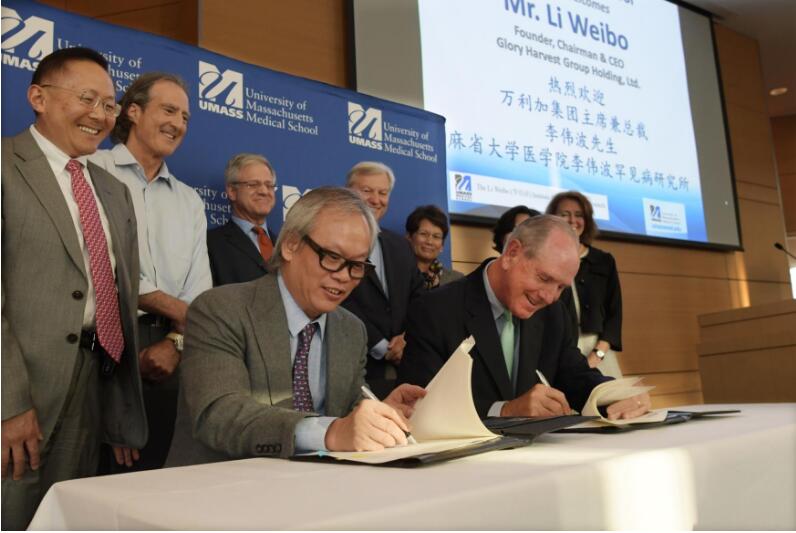Author: GHG CreateDate: 2018-01-09

WORCESTER – University of Massachusetts Medical School has received one of its largest donations ever, to establish an institute to study rare diseases, medical school officials announced Tuesday.
The Li Weibo Institute for Rare Disease Research, supported by a $10 million endowment gift from the Li Weibo Charitable Foundation in China, will be home to existing faculty whose expertise has led to profound discoveries related to diseases including ALS, cystic fibrosis, Canavan disease, Rett syndrome, Huntington’s disease, fragile X syndrome and other disorders.
Mr. Li, a Chinese businessman and philanthropist, also contributed $750,000 to educate five graduate students from China per year, for five years, studying biomedical sciences.
“He recognizes our talent pool is global,” said Dr. Michael F. Collins, chancellor of UMass Medical School.
Dr. Collins told a room full of medical school faculty and officials that he met Mr. Li, who is the founder, chairman and CEO of Glory Harvest Group Holding Ltd., through Guangping Gao, a professor of microbiology and physiological systems and director of the Horae Gene Therapy Center and Vector Core at UMass Medical School.
Mr. Li, from Shenzhen, China, told the audience, with Mr. Gao translating, that he had received no more than an elementary school education. During the Cultural Revolution, he said, “I don’t have the opportunity to go to school.”
He started in business at age 17 and watched China grow, opening its doors to the world.
In 2013, Mr. Li established a charitable foundation, with the commitment to donate half of his personal wealth to make the world a better place.
The foundation supports three main areas: education, orphans and other people in need, and, through selective donations to targeted institutions, health and biomedical research.
At a dinner at Dr. Collins’ house in June, Mr. Li was struck by the story of a parent of a child with a rare disease, who had made a contribution to the medical school.
“I’m not only a successful businessman, but I’m also a father,” Mr. Li said. “UMass is a place I can trust.”
“Mr. Li was quite impressed by the science undertaken each and every day here in our institution,” Dr. Collins told the audience.
He said that rare diseases, which the National Institutes of Health defines as those generally affecting fewer than 200,000 people, often don’t receive the same focus or support as diseases that affect more people. By establishing an institute devoted to studying a collection of these rare diseases, Mr. Li could make a difference to people around the world.
Mr. Li’s “visionary and generous” gift will have “an unparalleled ability to make impacts on an entire range of terribly disabling diseases,” said Dr. Terence R. Flotte, provost and dean of UMass Medical School.
Dr. Flotte said he receives emails every week from parents of children with these kinds of diseases. Now, “We are going to be able to, in some cases, say that if they are willing to participate in pioneering trials we may, in fact, be able to help them.”
Researcher Craig C. Mello, who was awarded the Nobel Prize in medicine 11 years ago and continues to search for treatments using RNA interference, welcomed Mr. Li to “our team,” and said, “It’s your friendship and your interest that really is the most meaningful gift.”
The institute will be directed by Mr. Gao and Dr. Michael Green, Howard Hughes Medical Institute investigator and chairman of molecular, cell and cancer biology.
Dr. Green said that by bringing together researchers who are working on diseases that are different, but may share common genetic mechanisms, progress toward finding treatments will be accelerated.
The institute also “will be a vehicle for getting the word out there as well as in here” about the work being conducted at UMass, and serve as a center for working with outside partners.
This year, two gene therapies for rare diseases have gone into their first in-human studies, an important step forward, said Dr. Katherine Luzuriaga, director of the Center for Clinical and Translational Science. Mr. Li’s gift will accelerate such progress.
“Diseases know no borders and science speaks in one language,” said Dr. Silvia Corvera, co-director of the MD/PhD graduate program at UMass. She said the gifts, including investing in the next generation of international researchers, “will foster the leaky borders that are so necessary” for outstanding science.